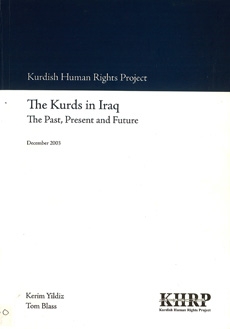|
FOREWORD
With the demise of the rule of the Ba’ath party in Iraq, the country’s Kurdish population faces a new chapter in the political and regional development of its region. For over a century the Kurds have been subject to the grand schemes of other powers, denied autonomy, and have faced the onslaughts of military assaults, economic embargo, and the destruction of their native regions.
This publication is intended ro provide an outline of some of the issues affecting the Kurds in Iraq. It provides a brief exploration of the past’s effect on the present, and of how both the Kurds and the international community may avoid repeating previous mistakes, laying the foundations for an internationally recognised autonomous region committed to pluralistic democracy and human rights. Such a region would require a commitment to the rule of law and internationally recognised human rights standards.
In the intervening years between the First Gulf War and the 2003 US-led war against Saddam, the Kurds established a democratic administration, which has persevered despite a lack of assistance from the international community to facilitate its establishment or indeed any international recognition. Iraqi Kurdistan serves as a role model not only for Iraq but also for the rest of the Middle East, particularly with regard to adherence to human rights principles, including women’s rights and freedom of expression. The study proposes that the Kurds should continue to have full and equal participation in the reconstruction of Iraq. The study also details a range of human rights policies to the Occupying Powers, the international community and the Kurds themselves. The publication highlights the international initiatives possible to ensure the economic and social development of Iraqi Kurdistan, including equitable distribution of the revenues of oil and the Oil-for-Food Programme.
This publication provides a scholarly analysis of the urgent and as of yet unanswered question: what is to be the future of the Iraqi Kurdistan bearing in mind what was achieved after the First Gulf War in 1992? In BHRC’s view, unless the rule of law is quickly established throughout post-war Iraq, the future of the whole region remains bleak.
The research and writing of this publication was undertaken by Kerim Yildiz, Executive Director of the Kurdish Human Rights Project, and Tom Blass, freelance lawyer and journalist. The advice and assistance of KHRP staff members and other experts is gratefully acknowledged including that of Clodaghmuire Callinan and Rochelle Harris. This publication was made possible by the financial support of the Sigrid Rausing Trust.
Mark Muller
Vice President, Bar Human Rights Committee of England and Wales
Introduction
With the demise of the rule of the Baath party in Iraq, the country’s Kurdish population faces a new chapter in the political and regional development of its region. For over a century the Kurds have been subject to the grand schemes of other powers, denied autonomy, and have faced the onslaughts of military assaults, economic embargo, and the destruction of their native regions.
Some of the landmarks in the history of Iraqi Kurdistan - perhaps most notably the chemical and gas attacks at Halabja, the 1991 uprising and the subsequent flight of over two million refugees - have been so egregious as to have become imprinted on the consciousness, and sometimes conscience, of the outside world. Other events are less well-known and less well understood: such as US and Iranian involvement in Iraqi Kurdistan in the 1970s, Turkish intervention, the nascent democracy of the autonomous area and the double embargo effect of Saddam Hussein’s economic siege and United Nations (UN) sanctions. This publication is intended to provide an outline of some of the issues affecting the Kurds in Iraq. It provides a brief exploration of past history’s effect on the present, and of how both the Kurds and the international community may avoid repeating previous mistakes, laying the foundations for an autonomous region committed to a pluralistic democracy and human rights.
There are no exact ethnological or linguistic criteria by which the Kurds can be defined. There are a number of Kurdish dialects. There is no single religion that binds them, and they are to be found in numerous countries. Paraphrasing Benedict Anderson one might say that Kurds are those that believe themselves to be so. 4 Kurdish identity, however, is not monolithic. While some Kurds believe passionately in the existence of a pan-Kurdish nation, others are bound more closely to other identities; tribal, national, or religious.
Standing at the crossroads of so many powerful nations, the Kurds have … |
